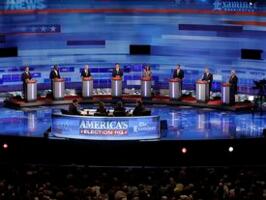Clinton vs. Trump: Still A Dead Heat
Presidential frontrunners Hillary Clinton and Donald Trump remain all tied up in a hypothetical matchup heading into 2016.

Presidential frontrunners Hillary Clinton and Donald Trump remain all tied up in a hypothetical matchup heading into 2016.

Following Saturday night's debate, the race between the top two contenders for the Democratic presidential nomination is closer than ever, but Hillary Clinton is the heavy favorite among voters who are already certain of their vote in 2016.

Most U.S. voters still don’t care too much for Russian President Vladimir Putin but don’t think his recent praise of Donald Trump will hurt the latter’s bid for the presidency. At the same time, voters agree with Trump that the deteriorating relationship between the United States and Russia is not good for America.

Political lightning seems unlikely to strike Hillary Clinton twice.

Despite society’s ever-growing reliance on the Internet, most voters still prefer to turn on the television to get their political news.

Donald Trump still holds the lead in Rasmussen Reports’ latest look at the race for the Republican presidential nomination following Tuesday night’s debate. His voters also are by far the least likely to say they’re going to change their minds.

While voters are evenly divided on the effectiveness of the new international climate change agreement, most think it will increase energy costs here at home, and few are willing to pay those additional costs.

Only voters can now stop businessman Donald Trump’s march to the White House. Last night’s Republican debate seemed a tacit acknowledgement of that, with only the long-shot candidates willing to take Trump head-on.

A lot of voters claim to be following the debates between the presidential candidates from both major parties but don’t feel they have learned much about those candidates so far.

More voters than ever see a worsening relationship between the United States and the Islamic world, but they are less convinced that most Muslims around the world view America as an enemy and vice versa.

Despite an international uproar and condemnation by President Obama and nearly all of those running for the presidency, Donald Trump’s proposed ban on Muslims coming to the United States has the support of a sizable majority of Republicans – and a plurality of all voters.

Voters are far more likely to think the media is biased against Republican presidential front-runner Donald Trump than against his chief Democratic rival Hillary Clinton.

President Obama on Sunday, in an address to the nation about the recent shooting massacre in San Bernardino, California, described the incident as terrorism but also said it highlighted the need for more gun control. Voters place far more importance on the terrorism aspect in this case, but they are slightly more supportive of a federal database listing all gun owners in the country.

Following the first major attack by radical Islamic terrorists on American soil in several years, President Obama sought to reassure Americans in a speech to the nation Sunday night that the federal government has things under control. He outlined the measures being taken to fight the radical Islamic State group (ISIS), called for more gun control and cautioned against anti-Muslim bias.

Most believe the gun policies of the National Rifle Association make this country safer, perhaps in part because Americans tend to think more gun control will only hurt law-abiding citizens.

Some have suggested the presence of more Americans with concealed carry gun permits will reduce the number of people killed in violent incidents in this country. Americans tend to think that’s true but aren’t strongly sold on the idea.

Some politicians have charged that last week’s shootings at a Planned Parenthood clinic in Colorado were politically motivated. Were the killings a domestic terrorist act? Americans say no.

Domestic Islamic terrorism or another random mass shooting? Authorities still aren’t sure or at least aren’t saying as the investigation in San Bernardino, California continues.

With increasing reports that terrorists regularly use the Internet to coordinate their actions, Americans think preventing potential criminal activity online is more important than maintaining complete Internet freedom, but they are sharply divided as to who should be doing the policing.